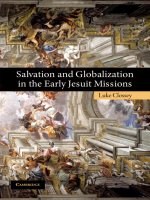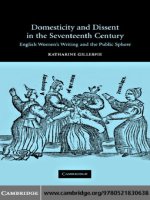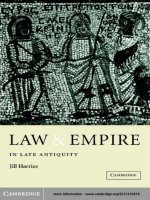0521810655 cambridge university press eros and polis desire and community in greek political theory oct 2002
Bạn đang xem bản rút gọn của tài liệu. Xem và tải ngay bản đầy đủ của tài liệu tại đây (1.77 MB, 414 trang )
This page intentionally left blank
Eros and Polis
Desire and Community in Greek Political Theory
Eros and Polis examines how and why Greek theorists treated political passions
as erotic. Because of the tiny size of ancient Greek cities, contemporary theory
and ideology could conceive of entire communities based on desire. A recurrent
aspiration was to transform the polity into one great household that would
bind the citizens together through ties of mutual affection. In this study, Paul
Ludwig evaluates sexuality, love, and civic friendship as sources of political
attachment and as bonds of political association.
Beyond the desire between persons, Greek erotic theory extended to abstract, impersonal objects of desire, such as imagined communities. Ambition,
patriotism, and cosmopolitanism were all diagnosed as erotic wishes. The imperial temptation to transform the polity from a republic to a more “global”
community was seen as the desire to partake of foreign customs, fashions, and
the commodification of other cultures’ products.
Studying the ancient view of eros recovers a way of looking at political
phenomena that provides a bridge, missing in modern thought, between the
private and the public spheres, between erotic love and civic commitment.
Ludwig’s study thus has important implications for the theoretical foundations
of community.
Paul Ludwig is a Tutor at St. John’s College, Annapolis, Maryland.
Eros and Polis
Desire and Community in Greek Political Theory
PAUL W. LUDWIG
Cambridge, New York, Melbourne, Madrid, Cape Town, Singapore, São Paulo
Cambridge University Press
The Edinburgh Building, Cambridge , United Kingdom
Published in the United States of America by Cambridge University Press, New York
www.cambridge.org
Information on this title: www.cambridge.org/9780521810654
© Paul W. Ludwig 2002
This book is in copyright. Subject to statutory exception and to the provision of
relevant collective licensing agreements, no reproduction of any part may take place
without the written permission of Cambridge University Press.
First published in print format 2002
-
isbn-13 978-0-511-07274-1 eBook (EBL)
-
isbn-10 0-511-07274-0 eBook (EBL)
-
isbn-13 978-0-521-81065-4 hardback
-
isbn-10 0-521-81065-5 hardback
Cambridge University Press has no responsibility for the persistence or accuracy of
s for external or third-party internet websites referred to in this book, and does not
guarantee that any content on such websites is, or will remain, accurate or appropriate.
To my mother and father
Contents
Acknowledgments and a Note on Citations
page xi
Introduction
Aims, Method, Scope
Eros Ancient and Modern
Political Eros
Criteria for Applying Eros to Politics
An Older Way of Viewing Political Phenomena
Potential Contributions of the Classical Theory
of Political Eros
Themes and Divisions
1
3
7
10
12
14
16
19
part one. Political Eros: An Account from the Symposium
one. Statesmanship and Sexuality in Aristophanes’ Speech
1.1. Political Pederasty
1.2. Irony and Political Satire
1.3. Manliness as a Political Principle
1.4. Love of Same and Love of Other
1.5. Love of Wholeness
1.6. Preliminary Conclusions
two. Law and Nature in Aristophanes’ Speech
2.1. Modern Contexts
2.2. Myth and “Nature”
vii
27
28
39
48
54
57
65
69
69
71
Contents
2.3.
2.4.
2.5.
2.6.
2.7.
2.8.
2.9.
2.10.
Erotic Gods and Heroic Humanism
The Return to Original Nature
Law and Civil Religion Reconsidered
Synoecism and the Emergence of Law
Prepolitical Eros?
The Natural Origins of Nomos
The Reciprocity of Eros and Law
Modern Contexts: The Theoretical Implications
76
79
86
91
97
101
105
109
part two. The Discourse of Political Eros
three. Scientific and Poetic Traditions of Eros in Thucydides
3.1. Eros in Homer and Archaic Poetry: Semantic Issues
3.2. Eros in the Tragedians
3.3. Eros in Natural Philosophy and Sophistic Thought
3.4. Eros in Political Oratory and Prose: A Fashionable
Fifth-Century Rhetoric?
3.5. Thucydides’ Concept of Political Eros
four. The Problem of Aggression
4.1. Hubris and Class Domination in the Ancient Democratic
Ideology
4.2. Eros and the Thumoeidetic
4.3. The Symposium Again: Eros and Philia
five. The Problem of Sublimation
5.1. Sublimation and Love: Hippothales in the Lysis
5.2. Reading Athenian Conventions
5.3. Barriers to Fulfillment: Their Use in Courtship
5.4. The Fragility of Greekness: The “Better Argument” in
Clouds
5.5. Aristophanic Politics?
121
124
131
136
141
153
170
171
192
212
221
222
229
235
245
254
part three. The Polis as a School for Eros
six. Civic Nudity
6.1. Rationalism and Meritocracy
6.2. Shame and the Case for Barbarism
6.3. The Greek Ideal
viii
261
262
275
287
Contents
6.4. A Constraint on Desire
6.5. The Schooling of Eros
seven. Patriotism and Imperialism as Eros
7.1. The Love of One’s Own: From Family to Community
7.2. Acquisitiveness and the Love of Honor: Filial and Erotic Models
7.3. Community, Patriotism, and Civic Friendship
7.4. Patriotism and the Love of Beauty
7.5. Colonialism, Territoriality, and the Beauty
in Transgression
7.6. Security, Profit, and Discontent with One’s Own
7.7. The Contemplative Desire and the Love of Beauty
in Politics
7.8. Cosmopolitanism and Cultural Acquisitiveness
7.9. Eros and the Demise of the Polis
List of Works Cited
Abbreviations
Other Works Cited
296
305
319
320
327
339
346
351
358
364
369
376
381
381
382
393
Index
ix
Acknowledgments and a Note on Citations
This book began as a dissertation in the Committee on Social Thought at
the University of Chicago. James Redfield placed his valuable and eclectic
store of classical and anthropological learning at my disposal. My thoughts
have also benefited immeasurably from the incisive criticism and friendship
of Nathan Tarcov. W. Ralph Johnson’s concern for the project as well
as his timely suggestions saved me from many errors. The genesis of the
dissertation was a seminar on Plato’s Symposium given by Leon Kass in
the Spring of 1994. Many of the ideas contained herein were elicited by
the remarkable discussions he led, and by subsequent reading groups and
conversations. Clifford Orwin’s inspiring introduction to Thucydides was a
high point of my time at Chicago. My understanding of the topics covered
in this book have been greatly influenced by his ideas. Finally, I owe a debt to
the Department of Classics, in particular to the teaching of Anne Burnett,
who showed me what a classicist could be, and to the scholarly help and
professional advice of Peter White.
Two fine classicists, Keith Jones and Katherine Kretler, assisted in the
research at the University of Chicago, sometimes e-mailing vast amounts
of information to me in places as far away as Pakistan.
Generous funding for the project was provided, at the dissertation
level, by the Woodrow Wilson National Fellowship Foundation, the John
M. Olin Center at the University of Chicago, and the Bradley Foundation.
The additional research and writing necessary to make a book were made
possible by a John M. Olin Foundation junior faculty fellowship. A shorter
version of Chapter 1 was published by the Johns Hopkins University Press
in the American Journal of Philology.
xi
Acknowledgments and a Note on Citations
Audiences at Princeton’s Department of Politics, at several panels in
meetings of the American Political Science Association and the American
Philological Association, in the John M. Olin lecture series at the University of Chicago, and at Harvard’s Department of Government have helped
shape the book. At St. John’s College, Eva Brann, A. P. David, Michael
Dink, Harvey Flaumenhaft, Mera Flaumenhaft, Katherine Heines, Henry
Higuera, Samuel Kutler, Nicholas Maistrellis, Carl Page, George Russell,
Joe Sachs, and Walter Sterling have all enhanced my understanding of
these topics. So have a host of my students. Maya Alapin, a fine student
of Greek, created the index. Cara Sabolcik of the Greenfield Library at
St. John’s did a wonderful job of supplying me with interlibrary loans. Listing the individuals whose comments on drafts, portions, or chapters have
helped me at one time or another risks leaving out important contributors,
but it would be remiss not to mention Danielle Allen, Eva Brann, anonymous reviewers at Cambridge University Press, Paul Carrese, Matthew
Crawford, A. P. David, Katherine Heines, George Kateb, Katherine Kretler,
and Jeremy Waldron. My wife Uzma has been my most perceptive, as well
as my toughest, critic. The dedication expresses my greatest debt.
Rather than place a formidable list of abbreviations between the book
and the general reader at the outset, I have chosen to abbreviate no names
and titles of classical authors and texts but only a small number of scholarly
sources likely to be of interest to classicists alone, deviating from this rule
to include a few works cited so often that economy was called for. Titles of
classical journals are cited in full to provide ease of reference for political
theorists and other academic readers. A list of the few abbreviations that
remain will be found at the back of the book.
Since multiple editions of the same classical texts are sometimes cited for
their editors’ commentaries, a word about which editions are referred to in
my quotations of texts and citations of passages is in order. For the plethora
of classical sources cited once or only a few times, the reader is referred to
any standard edition of the Greek text; I have tried to note and include in
the references sources for which the line numbers are not sufficiently standardized or places in dramas (for example) where scholarly disagreement
over the attributions of lines might cause confusion. As for often-used
sources, citations of Plato’s Symposium refer to Dover’s Cambridge edition,
and citations of the Republic refer to the Loeb edition (Shorey). Thucydides
citations refer to the Loeb edition of C. F. Smith. Citations of the works
of Aristophanes refer to Sommerstein’s Aris and Phillips editions (with
xii
Acknowledgments and a Note on Citations
the exceptions of Clouds, for which I used Dover’s Clarendon edition, and
Knights, for which I used Hall and Geldart’s Oxford Classical Text). Citations of Aristotle’s Politics refer to the Oxford Classical Text of W. D. Ross.
I have sometimes consulted translations, but the reader should be advised
that the translations given are my own renderings. The list of works cited
is not, needless to say, a bibliography. I have followed the style generally
accepted among classicists: for Plato, Stephanus pages are followed by a–d
and the line numbers, which differ only slightly from edition to edition;
arabic numerals separated by periods refer to book, chapter, sentence or line
number, or other relevant subdivisions for several other classical authors
(for Aristotle two styles are used simultaneously: the book and chapter
numbers found in various editions and translations and favored by political
theorists, followed by the Bekker pages, columns, and line numbers used
by classicists). “P.” and “pp.” distinguish the arabic numerals referring to
pages in modern works.
xiii
Introduction
A recurrent feature of ancient Greek political discourse was the assertion
that erotic passion was a causal factor in the emergence and maintenance,
as well as the decline, of the Greek polis. Eros, the most private of passions,
was believed by ancient political thinkers to be of the utmost public relevance. For them, the term eros included the ordinary meanings of love and
sexuality but went beyond these to embrace a wide array of inclinations
comprising ambition, patriotism, and other aspirations that were properly
political in nature. Not only the soulcraft of Platonic philosophy but also
Thucydides’ hard-headed and purely political account of the Peloponnesian
War makes use of erotic terminology to describe ambition, including, for
example, a citizen’s ambition to serve the state, a community’s ambition to
liberate itself from bondage, and an imperial power’s ambition to attempt a
foreign conquest. The modern reader must question the accuracy of these
descriptions, asking, in particular, how closely the concept of eros in ancient psychology resembles our own experience of eros and how instructive
the comparison between political passion and eros is, after the differences
between ancient and modern concepts of eros have been taken into account.
In classical Athens, the discourse of political eros was both a rhetoric
and a theory. The large semantic field of the Greek word eros, comprising
political and other meanings, had been a linguistic feature of long standing. During the classical period, this existing resource of the language was
self-consciously appropriated, in political oratory and in political theory,
at times metaphorically and at times literally, to relate levels of human
experience among which the connections have not always been perceived.
Much of classical thought, explicitly and implicitly, based its notions of
1
Eros and Polis
eros on purely formal resemblances among sexual desire, love, and ambition as well as higher aspirations such as patriotism and cosmopolitanism.
Common features in the psychological responses to each of these passions
led orators, poets, and philosophers to conclude that said passions were
differing manifestations of a single, underlying eros. They were then able
to place the apparently diverse passions on a continuum with one another,
so that the logical progression, for example, from sexual license to tyranny
or from citizen lovers to loving the city, could seem unproblematic to them.
Eros therefore provided them with a bridge, missing in modern thought,
between the private and public spheres.
As a theory, the ancient conception of political eros has important
implications for the theoretical foundations of republicanism, including
the foundations of modern representative and participatory democracies.
At the core of every republican regime lies a particular political psychology
in which a carefully negotiated balance between personal liberty and civic
dedication remains satisfying and fulfilling to most citizens. The longevity
of modern liberal democracy rests on the beauty or dignity of the life
lived in accordance with this balance. Since greater liberty and greater civic
dedication are both goods and since the two cannot normally be increased
simultaneously, it follows that the republican life will often appear, by turns,
restrictive of personal liberty and insufficiently dedicated to the common
good. Democratic citizens will therefore be vulnerable to longings that
a liberal democracy cannot satisfy, longings both for greater individual
autonomy and for stronger ties of obligation and affection among fellow
citizens.
These two longings, which have generated the separate streams of individualism and communitarianism in American thought, were the subjects of
exhaustive study in classical political philosophy, as the chief psychological
factors contributing to both the formation and the dissolution of republican government. Both tendencies, the desire for perfect freedom as well as
the need to belong to a greater whole, were diagnosed as erotic wishes by
classical authors. Plato and Aristophanes, for example, were particularly interested in the aspiration to transform the polity into one great household,
binding the citizens together through ties of mutual affection. Likewise,
Thucydides, Aristophanes, and Plato all understood the transformation
from republic to empire to be motivated, in part, by a cosmopolitan yearning, the desire to partake of foreign experiences, products, and customs; in
their view, many Athenians wished to transcend the confining limitations
2
Introduction
of the local and the particular. In these theories, private preferences have
public implications. Defining the limits of those implications, determining
when private choices affect and when they do not affect the balance struck
by republicanism between individual liberty and dedication to the common
good, remains a crucial problem for political theory today.
Aims, Method, Scope
The present study aims to restore a portion of the classical understanding of eros to its place in political theory, in part so that modern debates
about privacy and sexuality can utilize the full resources of the tradition. In
addition to contributing to our own pressing debates about sexual norms,
it is hoped that the concept of political eros will prove to be of value for
explaining behavior in areas beyond what are normally considered erotic.
Although ancient Greek sexuality has been the theme of much recent classical scholarship, the present study aims to exhibit an equally interesting
side of Greek eros lying elsewhere and comparatively neglected by both
classicists and political theorists: in the political psychology, aspirations,
and idealism animating the classical polis, the failures and successes of
which reveal the limits of political possibilities. In making a first approach
to a theory of political eros, this study concentrates on building bridges
from the existing scholarship on ancient sexuality to the more fully political
conception of eros. Since what is attempted is to recover an unfamiliar way
of looking at political phenomena and since the assumptions behind that
unfamiliar perspective are by no means explicit in the texts, the burden of
the study is to explore suggestions in the texts of ways in which eros might
be political or be made political. Some examples examined are the rivalry
between citizen lovers and beloveds, in which the older lover provided a
role model for the ambition of the younger beloved; eros as hubris or the
aggressive self-aggrandizement implicit in the desire to dishonor others, for
example, sexuality used to establish and maintain hierarchies; and finally,
the “sublimation” of eros into abstract objects of desire such as love of
country.
The methodology is primarily an exegesis of texts: many sections are
restricted almost entirely to drawing out assumptions of the discourse and
indicating internal implications. The approach is literary and philological,
and the interpretations are intended to stand on their own as a new comparative study of several related classical texts. Beyond this literary–critical
3
Eros and Polis
purpose, however, it is hoped that the ancient discourse, both the theory
and the rhetoric, can expand our knowledge of the latent potentialities of
our nature by showing what happens to human eros under different political conditions. It is conceivable that the small, face-to-face societies that
comprised much of the life of the polis schooled eros in ways that enabled
ancient thinkers to perceive features of eros that we have not seen or that
appear in confusing guise in modern society. Clarity about those features of
eros might be expected in turn to shed light on our own political choices.
However, the remarkable extent to which modern scholarship, going back
at least to Rousseau,1 has shown eros to be constructed by social forces,
necessitates paying close attention to the sociology of eros. Sociology includes not only ancient practices and mores but also the texts that report
them; our access to the history of ancient eros is largely dependent on
the same texts that are under study. A selection bias of the theorists left
out large chunks of fact that can be only speculatively supplied, the most
obvious example being their almost exclusive interest in male eros. As will
become clear, the male bias of the civilization heavily influenced the politicization of eros. As a supplementary methodology, several sections and one
entire chapter (Chapter 3) situate arguments from the political theories of
eros in a broader context of Greek oratory, historiography, epic and tragic
poetry, and political satire, as well as in the context of ancient philosophy.
Although the disagreements among ancient authors can be more instructive
than their consensus, a wide range of evidence nevertheless demonstrates
the broad currency of this discourse throughout the classical period and
traces its roots in earlier Greek thought and language.
In addition, an attempt is made to test the plausibility of the ancient
theories of eros against modern experience. Although the many pitfalls of
such a comparison are obvious, it would be impossible to engage the texts of
Thucydides, Aristophanes, and Plato adequately without assigning to their
words some portion of our own experience. Not without trepidation, then,
does the study bring to bear modern and postmodern theories of eros, particularly those of Freud and Foucault, on the ancient theories. Keeping the
voices distinct has been the paramount concern of this exercise. Throughout, an effort has also been made to bring the ancient political discourse
into dialogue with the later history of political thought, including selected
contemporary authors. This study cannot pretend to have exhausted the
1 J.-J. Rousseau, Second Discourse, pp. 154–7. Compare Emile, p. 333.
4
Introduction
resources of the discourse of political eros, even in the three classical authors chosen as representative of it: for example, Ecclesiazusae and Lysistrata,
two plays in which eros and politics are thematic, have been left for a future
study. Much less does it survey the entire scholarship even on the various
facets of eros in these authors. The subject of political eros has required
ruthless narrowing and narrowing again, as it threatened to grow too broad
to be viewed whole. The outcome is a literary study and an attempt to
reconstruct a political theory. Although this study sketches the history of
a discourse, it makes few claims about political history, and certainly no
new ones, although it does offer new interpretations of some documents
on which social and political histories are, in part, based.
Including a comic playwright in the ranks of serious political thinkers
perhaps requires justification. Aristophanes’ political satire held up a mirror
to Athenian politics for almost forty years, during a period that witnessed
direct-vote democracy in its most advanced condition as well as experiments
with broad- and narrow-based oligarchies; Athenian imperialism reached its
zenith and collapsed during the same period. In response to these changes,
Aristophanes presented on stage a variety of political utopias – agrarian,
imperial, and communist – in order to show the psychologies of both expansion and reform while allowing the limitations or folly of the projects to
arise naturally out of their own assumptions. The satirist especially excelled
at portraying the psychology of political action: what motivates the agents,
what they tell themselves, and what they tell others, on their way up or down.
In classical studies, a long debate has gone on over whether serious views
can be ascribed to plays filled with manic humor.2 The carnival excesses
2 A. W. Gomme, “Aristophanes and Politics,” p. 108, writes that Aristophanes “may, in his youth,
have believed, wrongly, that it was his business to direct the counsels of the state . . . mistaking
the character of his own genius.” Gomme finds Aristophanes’ political opinions, even if they
could be recovered, irrelevant for his art (p. 97). G. E. M. de Ste. Croix, concerned with Old
Comedy’s usefulness as a source for ancient history, finds serious opinions “sandwiched” between
humorous passages (Origins of the Peloponnesian War, p. 357); he finds (p. 363) that the poet identifies
himself strongly with the character Dicaeopolis in Acharnians, the play arguably most strident
about its claims to instruct its audience about politics (e.g., lines 497–501, 644–5). L. Strauss,
Socrates and Aristophanes, also concludes that the poet shows solidarity with such characters or
choruses as speak in persona poetae; Strauss contends that the poet approves of characters’ schemes
to the extent to which he makes those schemes succeed (pp. 22, 69, 278), but maintains that
even if simple messages can be found side by side with humor, nevertheless more sophisticated
thought can be uncovered by taking “the ridiculous [as] all-pervasive” (p. 78). Contrast D. M.
MacDowell, Aristophanes and Athens, pp. 5–6, on M. Heath, Political Comedy in Aristophanes, pp. 16–21.
K. J. Dover, Aristophanic Comedy, p. 88, denies that Acharnians is “a pill of political advice thickly
5
Eros and Polis
in the plays, in my opinion, only serve to throw into relief the motivations
of the protagonists; we witness demagogues, cleruchs, yeoman farmers,
and imperialists acting entirely in consonance with their own wishes, free
of all communal restraint that might necessitate that they dissemble their
true desires. Although historians of antiquity must beware of mistaking
caricature for accurate portrayal of fact, political theorists will find that
such caricature often highlights the character traits of greatest interest: for
example, the religiosity of Nicias in Knights, 30–4, which was later to play
such a decisive role in the Athenian defeat at Syracuse.3 In addition, the
playwright, who caters to the masses more often than to the privileged few,
provides important access to demotic sentiments (spoken by his characters)
in an otherwise aristocratic mental culture. In particular, his satire on elite
pederasty allows us to see this sociopolitical phenomenon through the eyes
of the rank and file of farmers and (to a lesser extent) urban marketers.
Aristophanes’ works are a largely untapped resource for political theory.
In attempting to meet the standards of both classical philology and
political theory, this study runs the risk of falling in between the two disciplines. Relevance to modern problems is especially prized in political
theory, whereas in philology, relevance is the siren song that calls us away
from historical contextualization. Study of the classics takes its impetus
from love of the books on their own terms, but it acquires depth and
gravity only if the books speak relevantly to a felt need. My hope is that
the ancient view of political eros presented here will prove a useful supplement to, or correction of, the purely private eros of modern theory. The
liberal ideal that eros should be kept as private as possible is a deeply felt
ethical intuition that this study would otherwise wish to uphold. However,
sugared with humor”; Dover expands Gomme’s catalogue of the many inconsistencies that would
have to be explained before any coherent political views could be ascribed to Aristophanes. See
also S. Halliwell, “Aristophanic Satire,” pp. 16 and 19 as well as his Aristophanes, pp. xxxix-xlvii.
A. M. Bowie, “The Parabasis in Aristophanes,” p. 29, note 14, disagrees with Ste. Croix that
the poet has a special relationship with Dicaeopolis and points out that the “author” as he
functions in the play “is as much a literary construct as his hero” (p. 40; cf. Bowie, Aristophanes:
Myth, Ritual and Comedy, pp. 28–29). J. Henderson, “The Demos and the Comic Competition,”
pp. 273–4 explains that Aristophanes never steps out of the humorous because he would lose
his “fool’s privilege” of saying precisely what he wishes, no matter how unpalatable politically.
The king can pretend not to take seriously what the fool says yet seeks to reconstruct, in private,
a serious content from his fool’s comical criticism. Henderson alludes to an ancient anecdote
that when Dionysius, tyrant of Syracuse, wished to study the politeia of the Athenians, Plato sent
him a copy of Aristophanes (Life of Aristophanes, KA, pp. 42–5). “Historical or not, the anecdote
expresses the ancient attitude” (p. 272).
3 Thucydides 7.50.4.
6
Introduction
the moral goodness and political prudence of leaving certain erotic phenomena unregulated must be sharply distinguished from empirical claims
that those erotic phenomena are without political consequences and that
phenomena acknowledged to be political are not erotic in character. Investigating the degree to which eros can possibly remain private should prove
instructive. Postmodernism has already abandoned the liberal position, and
the vulnerability of privacy to theoretical attack from both left and right
leads us to wish to place it on a firmer basis.4
Eros Ancient and Modern
In classical Greek, the term eros5 had a range of meanings covered by the
English words love and lust. It emphatically did not extend so far as the
modern idea of love as “caring” or altruism. Eros, even at its most innocent,
never lost a sense of “longing” and usually meant the desire to possess for
oneself. The Greeks did not hasten to condemn such a lover for selfishness.
Instead, they were keenly aware that people often perform acts of service
in hopes of winning favor in the eyes of their beloved. The arguments for
the political utility of eros relied on precisely this psychology.
A different group of words, for example, aphrodisia and (more rarely)
aphrodite, was sometimes used to mean, respectively, sexual pleasures and
sexual desire, often without reference to love. An amount of overlap existed
between the two concepts of love and sex. In Greek texts, eros can, but need
not, connote sexual arousal. The fact that the specifically sexual signification
is covered by the other group of terms frees up the term eros, particularly
when contrasted with ta aphrodisia or cognates, to mean a passion closer
to our romantic love.6 When not so paired, eros can mean either or both.
4 See, for example, Foucault, The History of Sexuality, Vol. 1, pp. 45–9. In the realm of practical
politics, the rebirth of the movement to legislate morality (e.g., in the Colorado Amendment 2
case Evans v. Romer) is far surpassed by national conventions of journalists who solemnly debate
the ethics of “outing” people who wish to keep their practices clandestine.
5 Italics will mean that the Greek word rwv is referred to exclusively. Lack of italics will mean
that the modern English word is being used, but the reader should be aware that the English
word “eros” will often be used to convey what this study contends is the broader range of
meanings associated with the ancient concept in the classical period. For a full discussion, see
Chapter 3. As a general rule, less familiar Greek words will appear first in italics, which they
will then lose as their meanings are clarified.
6 The charge of anachronism, viz., that “romantic” love is a product of the medieval period of
western history, does not take into account evidence from, e.g., Plato’s Lysis, 204b 1–205d 4
7
Eros and Polis
A tendency of recent scholarship has been to reduce the meaning of eros
in all instances to sexual desire. For example, K. J. Dover in a dozen dense
pages never quite succeeds in distinguishing eros from an especially strong
desire for sexual intercourse. Love, gallantry and honor, romance, “grand
gestures,” and military heroism for the purpose of impressing the beloved,
all of which Dover catalogues, remain epiphenomenal to eros in his account,
each one caused by eros but none of them, not even love, falling under
the domain of eros as strictly defined.7 Yet Dover’s alternative for “love”
in Greek, the philia word group (denoting dearness, belonging, friendship)
does not do justice to the vehemence of the previously mentioned acts
of passion, nor was it often used in classical Greek to refer to the more
passionate aspects of love.8 This is just one important instance in which
modern assumptions about eros color the interpretation of classical texts.
Easy acceptance of reductionism (the “order of science”) risks neglecting the phenomenology of eros (the “order of experience”). Eros in the
sense of falling in love, or romantic passion, does not immediately desire
genital contact and may, in the young or na¨ıve, even be unaware of sexual
intercourse. Sexual reductionism thus simplifies our own experience drastically. While Dover sought to provide a corrective to the chaste picture of
Greek homoeroticism promulgated by a previous generation of scholars,9
subsequent scholarship no longer has the same excuse for neglecting the
(see the discussion in Chapter 5). Compare K. J. Dover, ed., Symposium, p. 3 and Dover, Greek
Homosexuality (hereafter GH ) pp. 50–2, 123–4. Christianity, however transformative, did not
create love.
7 GH, pp. 42-54 (especially pp. 49–51). Compare Dover, ed., Plato. Symposium, pp. 1–2: Eros is “desire doubled” in Prodicus’ dictum (fragment 7.2 DK = Stobaeus 4.20.65). Dover’s translations
rightly distinguish between English “love” and “in love,” the latter being the more appropriate
translation for eros, e.g., p. 45 (the translation of philia at Symposium, 179b, as “in love” is a slip,
p. 52). Nevertheless Dover’s assumption is that eros qua being in love differs from “[sexual]
desire divorced from eros” (pp. 44–5) only by being a much stronger sexual desire, one that
is “obsessive, more complex” (p. 44; cf. “obsessive focussing of desire on one person,” p. 63).
This assumption cannot be made compatible with his subsequent analysis (pp. 63–4, described
in note 8 of this chapter).
8 It is not accidental that Dover defines eros as strong sexual desire when contrasting eros with philia
(GH, pp. 49–50) and yet acknowledges the justification for removing the genital dimension from
eros to leave only “falling in love” when contrasting eros with aphrodisia (pp. 63–4). This raises the
question of what Dover means by obsessively focused sexual desire in the absence of any genital
activity. If by “sexual” desire he means not genitally active desire but any desire having to do
with the difference between the two sexes (GH, p. 206), with homosexual desire shifted under
“quasi-sexual” desire (GH, pp. vii–viii), it then becomes unclear to what differences between
the sexes he refers.
9 For example, GH, p. vii.
8
Introduction
full range of emotional phenomena, that is, for neglecting, in particular,
love.10 It is difficult to imagine a similar oversight occurring in studies of
heterosexual relations in, say, a period of comparable interest in European
history.
A less reductive view of eros, which relates eros to sexuality without
making the two terms coextensive, can be found in ancient thought. For
example, the close relationship between aphrodite and eros is implicit in the
traditional pairing of the gods who bore their names.11 The god of passionate
love, Eros, was the son or accomplice of Aphrodite, the goddess of beauty,
of sexual attraction, and of reproduction. Passionate love, viewed thus, is
inextricably bound up with sexuality; indeed, all eros may be seen as arising
from sexual desire, its root cause. In Hesiod, however, there are two accounts
of the origin of Eros. In one of the accounts, Eros appears after the birth of
Aphrodite, as one of her attendants, and this rendering became traditional.
However, in another, earlier Hesiodic account, Eros appears as a primary,
cosmogonic hunger, which precedes Aphrodite and most of the other gods.12
In this earlier account, erotic desire ceases to be derivative from something
more basic than itself and takes its place as a fundamental category. All
intense desires, whether bodily or spiritual, would have to be referred to
this basic structure of yearning. Sexual desire, on this reading, would be one
(limited) type of eros among other types of eros. Poetic and philosophical
10 Two studies indebted to Dover but outside the stream of thought he initiated achieve a better
balance: A. Carson, Eros the Bittersweet (see occasional subsequent references); and C. Calame, The
Poetics of Eros in Ancient Greece (see especially pp. 13–23, 51, 65; cf. p. 72). Calame includes a brief
treatment of the relevance of eros for Greek political institutions (pp. 91–109). He goes too far,
however, in assimilating the dominant/submissive dichotomy almost entirely to the inversions
of educative initiation rites (p. 55, note 5; p. 100, note 18; pp. 107–8; cf. pp. 198–9), and he
becomes oversubtle in attempting to explain away the same dichotomy in comic invective (pp.
134–41). Calame’s preference for a more benign view of eros (pp. 27–38) seems to wish away the
more violent aspect of hierarchy stressed by Dover and Foucault (The Use of Pleasure) a view that
then became orthodox (cf. D. M. Halperin, One Hundred Years of Homosexuality and J. J. Winkler,
The Constraints of Desire). D. Cohen, Law, Sexuality and Society and Law, Violence, and Community, leaves
the dominant/submissive hierarchy intact but emphasizes its relation to hubris. J. N. Davidson,
Courtesans and Fishcakes, attempts to break the orthodoxy by concentrating on natural pleasures;
see the critical review by P. A. Cartledge. B. S. Thornton, Eros: The Myth of Ancient Greek Sexuality,
likewise tacks against the orthodox view by focusing on Greek references to horror at and
disgust with eros. My own opinion is that including love within the parameters of eros should
not entail forgetting that the full range of eros might also include aggression. Thus in these
different streams of modern scholarship, eros seems robbed, by turns, of either its beauties or
its dangers.
11 For example, Hesiod, Theogony, 188–206.
12 Contrast Hesiod, Theogony, 116–22 with 188–206.
9









